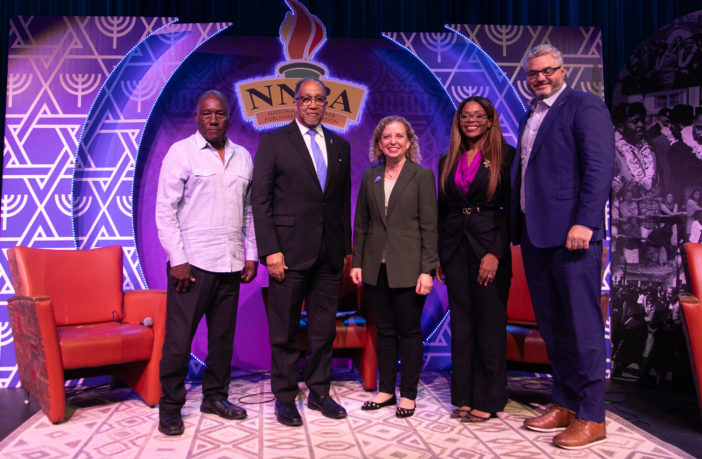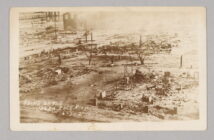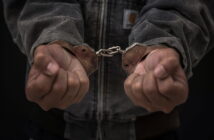By Aria Brent
AFRO Staff Writer
abrent@afro.com
The National Newspaper Publishers Association (NNPA) held their Mid-Winter Training Conference Jan. 24-27 at the B Ocean Resort and Hotel in Ft. Lauderdale, Fla., where they hosted representatives of the 250 Black-owned newspapers and media companies of their membership. The theme for this conference was “Empowering in 2024: The Black Press, The Black Vote and Black America,” and throughout the conference there was a heavy focus on how vital the Black and Jewish community have been to each other throughout history.
On the first day of the conference, the NNPA National Town Hall Meeting titled, “Reaffirming the Relationship between Blacks and Jews in America” was held at the African American Research Library and Cultural Center. The town hall was kicked off by NNPA Chairman Bobby R. Henry and was facilitated by NNPA CEO and President Rev. Dr. Benjamin Chavis Jr. During the town hall a series of members from the Black and Jewish community spoke on a panel about the need for the two groups to come together for the progression and empowerment of each other.
“We all need to take personal responsibility to make sure that we lean in on restrengthening the relationships between the Black and Jewish communities,” said U.S. Rep. Debbie Wasserman Schultz (D-Fla.) “Make it our personal responsibility to have dialogue in the parlors of our homes and in the community organizations. to decide to host programming that can bring our communities together, and make sure that we’re there for each other in non-stressful and non-violent times.”
Schultz furthered her sentiments by mentioning past instances of Jewish and Black communities standing united, including the Civil Rights Movement and post World War II.
“Be there for one another, like when Jewish community leadership instinctively came down to the South to fight for the civil rights of Black people who were being discriminated against and harmed and beaten,” Schultz said. “Or like HBCUs did in the ‘30s and ‘40s when there were no universities in America that would employ Jewish refugee professors who had come from Europe. Our ties go back even further than that so it’s essential.”
The issues that Black and Jewish people fought against together haven’t disappeared–they’ve evolved and modernized themselves, still making them a threat to these communities. Congresswoman Sheila Cherfilus-McCormick (D-Fla.) discussed how modern-day issues such as voter suppression can be combated with intentional behavior and education.
“How do we restore and teach our children, who are disconnected, about the history of our ties and why these alliances are necessary? How do we teach our kids in this generation that you could never win alone–you have to have a coalition,” McCormick said.
Sharing the experiences she’s had with her own children, McCormick went on to discuss how she’s noticed how the youth struggle with taking a step back to look at who is standing with them during times of oppression and hardship.
“Somehow along the line, there’s been a disconnect with the generations, and I see this when I talk to my children and I ask them about different situations going on and they feel like there’s a distance,” said McCormick. “They said, ‘You know what mom, we’ve been fighting this by ourselves for so long’ and I said, ‘You know, you only feel like you’re fighting alone because you’re not stepping away and seeing where your comrades are.’ And I think it’s going to take a level of intentionality for us to fight that.”
McCormick encouraged the Black community to take a generational approach to committing themselves to reaffirming their ties with the Jewish community. Noting that in the age of social media and technology it’s become harder for young people to see past what’s in front of them, she believes that has created a huge divide amongst the two communities.
“Every generation has to understand that we must recommit ourselves to partner with each other every single time. That means my generation has to realize that we can’t win alone, the Jewish community has been here with us, and they will be with us moving forward,” McCormick said. “Our children have to learn now to recommit. What scares me is that I feel like our children are more divided than others. I remember when we grew up, we had more mixed people in our communities or where we went to work, but now they’re able to shelter themselves in the social media world.”
Along with McCormick’s point about emphasizing education amongst Black youth, the importance of using empathy and emotions during those lessons was mentioned as well. Longtime professor, historian and anthropologist Marvin Dunn shared how he’s taught interactive lessons that were done with the intention of making his students feel the emotions of the oppressed, noting that facts and feelings are equally important when learning history.
“In Miami we have the Holocaust Museum. I used to take my classes there and it’s incredible. We also have, in irony, the old slave ports where the slaves were in Miami. I think the Dade County School system should require every student in high school to go to the Holocaust Museum and that slave building because there they may experience feelings that relate to these experiences,” Dunn said. “Educate kids to go beyond just knowing the facts but also being able to identify the feelings.”
Dunn further explained that although Black and Jewish people know of each other’s sufferings, have found common ground within them and have even helped one another fight against them, there is a level of understanding the two communities need to reach by feeling what the other has endured.
“What do Blacks and Jews have in common? Suffering. We need to understand the feelings each other suffer. Which means we need to go to the places where we suffered or at least that represent that suffering so that education comes back with feelings and not just facts.”
The fight for civil rights, freedom and equality is one that is shared between Black and Jewish people. Just as the Black community is constantly fighting against systemically racist issues like voter suppression, the Jewish community is facing alarming rates of anti-Semitic hate crimes. However, the Anti Defamation League (ADL) has been a pillar in helping minority communities combat the agendas of White supremacists.
“What we have measured at ADL over the past three months since October has been alarming. We accounted for over almost 4,500 incidents of anti-Semitism over the past three months, that is almost a 300 percent increase,” said Max Sevillia, senior vice president of national affairs for ADL. “It’s not a unique experience the Jewish community is facing. Yes, these past three months have been unique but a little less than two years ago, the Black community was targeted in upstate New York by an extremist who was first looking at going after and killing Jews. ADL was one of the first organizations to go to Buffalo, be on the ground and show support for the Black community.”
Sevillia shared that following that mass shooting in May 2022, the ADL did exactly what was being discussed throughout the entire town hall–they bridged the gap and reaffirmed the unity amongst minority communities. Not only did they bring together civil rights organizations from Black and Jewish communities but Asian and Latino, as well, to create a coalition that aims to address all forms of hatred and oppression.
“We were one of the first communities to come together and build a coalition with the National Urban League, the NAACP, the Asian American community and the Latino community. We called for the White House to pay attention to the level of hate and extremism and how it was affecting all of our communities,” Sevillia recalled. “ADL with the leaders from the diverse coalition went to President Biden to reflect on the level of hate and it caused action. We came together at the White House for a summit, United We Stand, and that summit led to a commitment to have the sort of forums that you’re hosting today. It’s so important to take action together. Through action, through commitment and through allyship we are working towards building a better tomorrow.”
The battle against injustice, oppression and White supremacy is one that is best fought together. History shows how impactful the union of Black and Jewish communities was and the time to reaffirm it is now, reiterated Terry Sanders, publisher of the Omaha Star News and the town hall’s mistress of ceremonies.
“We believe a refocus on that relationship is warranted, given the assault on voting rights and diversity, equity and inclusion initiatives and a rise in anti-Semitism,” Sanders said. “The Civil Rights Movement and the Holocaust taught both groups about the lifecycle of hate–it simmers like a pot of greens and it has never died. It takes all of us to be vigilant in fighting the ugliness in all of its forms.”



